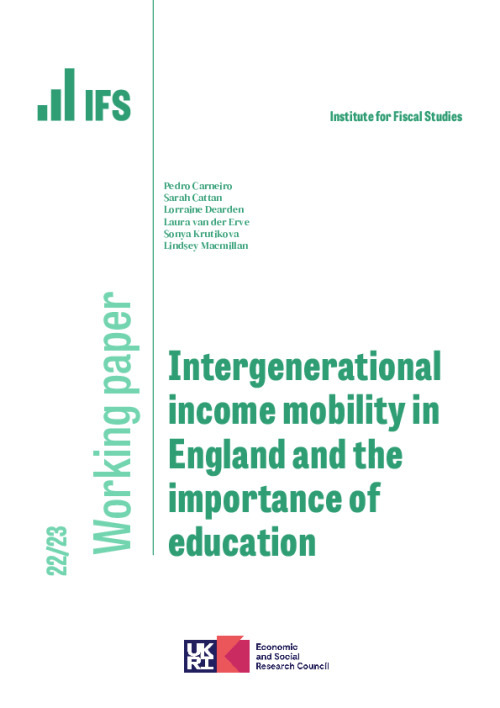Downloads
We use newly linked UK administrative to estimate absolute income mobility for children born in England in the 1980s. We find huge differences across the country, with a strong North-South gradient. Children from low-income families who grew up in the lowest mobility areas - overwhelmingly in the North - are expected to end up around fifteen percentiles lower in the income distribution as adults compared to those from the highest mobility areas - overwhelmingly in the South-East. Differences in average educational achievement across areas can explain 25% of this variation in absolute mobility within the country for men, and more than 45% of the variation for women. This indicates that education policy has an important role to play to equalise opportunities of children from low-income families across the country, though will not be sufficient to fully do so on its own. High mobility is further strongly related to stronger labour markets, more stable families, higher median income and better schools.
Authors

Lorraine Dearden

Research Fellow University College London
Pedro is a Professor of Economics at University College London and an economist in the IFS' Centre for Microdata Methods and Practice (cemmap).

Associate Director
Sarah is an Associate Director in the Education and Skills sector at the IFS, holding a British Academy Postdoctoral Fellowship.

Deputy Research Director
Sonya Krutikova is an Associate Professor of Economics at Manchester University and IFS Deputy Research Director.

Research Fellow University College London
Lindsey, an IFS Research Fellow, is a Professor of Economics and the Centre Head of Quantitative Social Science at UCL Institute of Education.

Laura van der Erve
Working Paper details
- DOI
- 10.1920/wp.ifs.2022.2223
- Publisher
- Institute for Fiscal Studies
Suggested citation
Carneiro, P et al. (2022). Intergenerational income mobility in England and the importance of education. London: Institute for Fiscal Studies. Available at: https://ifs.org.uk/publications/intergenerational-income-mobility-england-and-importance-education (accessed: 26 April 2024).
Grant
Related documents
More from IFS
Understand this issue

Sure Start achieved its aims, then we threw it away
15 April 2024

Why inheritance tax should be reformed
18 January 2024

How important is the Bank of Mum and Dad?
15 December 2023
Policy analysis

The short- and medium-term impacts of Sure Start on educational outcomes
9 April 2024

Sure Start greatly improved disadvantaged children’s GCSE results
9 April 2024

What you need to know about the new childcare entitlements
28 March 2024
Academic research

Labour market inequality and the changing life cycle profile of male and female wages
15 April 2024

Imagine your life at 25: Gender conformity and later-life outcomes
24 April 2024

Police infrastructure, police performance, and crime: Evidence from austerity cuts
24 April 2024
